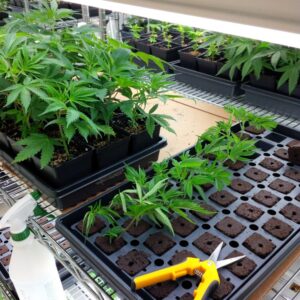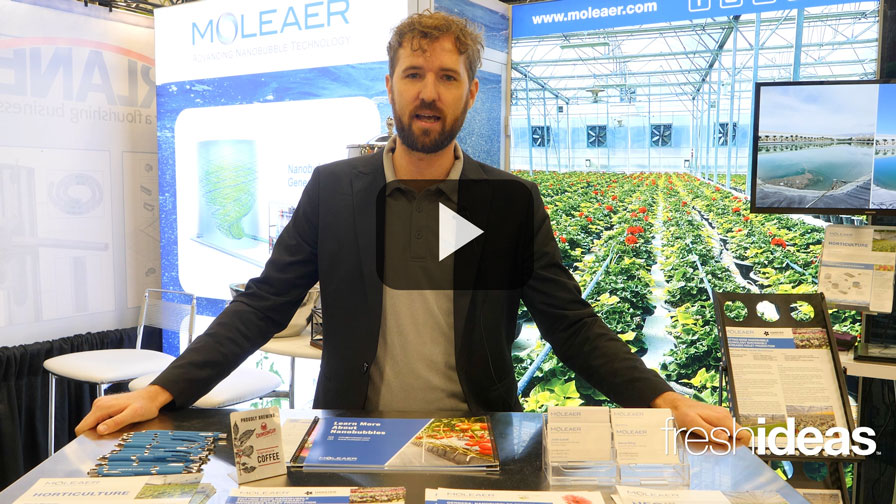Five Questions to Ask Before Buying Cannabis Cuttings From a Young Plant Supplier

Photo: Ryan Douglas
Commercial cannabis growers looking to jumpstart their cultivation program may find that acquiring quality genetics can be challenging.
Selecting new varieties from seed requires a lot of space, time, and labor, so buying rooted cuttings with known characteristics is preferred.
Fortunately, many cannabis companies are pivoting to supply this vital need, and demand will only increase as legalization spreads across the US.
But since most young plant suppliers are new companies, there’s no track record of quality or consistency.
Savvy operators know they must be careful when selecting new cultivars because the time and cost involved in propagating, growing, and processing a crop are substantial. If the final product is not what the grower was expecting, it can be an expensive disappointment.
What’s more, the situation can get costly before the growing even begins. Prices for rooted high-THC cannabis cuttings can range from $10 to $50 each, plus royalty fees for propagation. Some sellers bake the royalty fee into the initial purchase price, resulting in desirable cuttings that sell for as much as $1,000 each.
So, how do cannabis growers safely venture into the world of young plant suppliers? Very carefully! Ask these five questions as you vet potential suppliers in your quest for new genetics:
Where Can I See the Finished Product?
Trusting plant suppliers in a quasi-legal industry like cannabis can be risky. Even if you’re purchasing a well-known variety, it’s impossible to be 100% certain of what you’re buying.
Like any promise, the proof is in the pudding. Ask to see the finished flower. The supplier has likely sold that variety to another grower, or they grow it themselves. Find out which dispensary sells products from that specific cultivar and go there to purchase a sample. Even if that dispensary is out of state, the travel expense can be justified if you plan to populate large swaths of production with a new cultivar.
Does the Variety Come With Cultivation Guidelines?
Genetics providers should want you to succeed because a happy customer is a repeat customer. In floriculture, new varieties are accompanied by cultivation advice such as planting density, light intensity, and feeding recommendations. Cannabis should be no different. It’s not irrational to expect guidelines from a supplier when growing a new cultivar. The sale shouldn’t end with “Here’s your cutting. Good luck!”
Do you Have a COA for the Dried Flower?
Growers need more than an unknown seller’s assurance when contemplating the purchase of new genetics.
If the seller claims a certain cultivar is “fire,” have them prove it. Request a certificate of analysis (COA) for the dried flower of a variety you are interested in buying. A COA is a laboratory determination of the chemical properties of the flower, including the cannabinoid and terpene content, expressed as a percentage of the weight of a sample of dry flower. Usually, more is better. Higher THC and CBD levels will attract consumers at retail, and greater terpene percentages will result in a more flavorful product.
Do you Use Preventative Pest Control Protocols?
There’s nothing worse than loading up a new production facility with contaminated starter plants. Introducing insects and diseases that hitch rides on new plant material threatens the crop and the entire facility.
Ask the supplier about preventative pest control protocols for the stock plants and cuttings in production. Only tissue culture labs can guarantee that their plantlets are pathogen-free because they are propagated in a completely sterile environment. Suppliers that generate cuttings in a greenhouse or indoor setting can’t make this guarantee, but they can still take steps to ensure customers receive clean cuttings.
Ask about beneficial insect programs or preventative fungicide treatments applied to the stock plants and cuttings as they root. Professional suppliers should be happy to share their pest control protocols with potential customers.
Do you Test for Plant Pathogens?
Hop Latent Viroid (HpLVd) is a pathogen that infects a surprising percentage of cannabis plants across the U.S. Afflicted plants demonstrate stunted growth and decreased yields, and early detection can be difficult for even the most experienced growers.
One of the best ways to avoid the propagation of cuttings infected with this viroid is to perform periodic random testing of stock plants. An increasing number of diagnostic plant labs test for this pathogen, and home kits allow growers to identify HpLVd in-house.
Ask your supplier if they conduct random tests for plant pathogens. If they’re willing to provide you with a copy of the most recent negative test results, that’s even better.
Young plant suppliers need to provide more than just their word to ensure potential buyers that they’ll get what they’re paying for. If a supplier has the cultivars you desire but can’t confidently answer the five questions above, it’s probably best to keep your wallet shut and continue the hunt.









